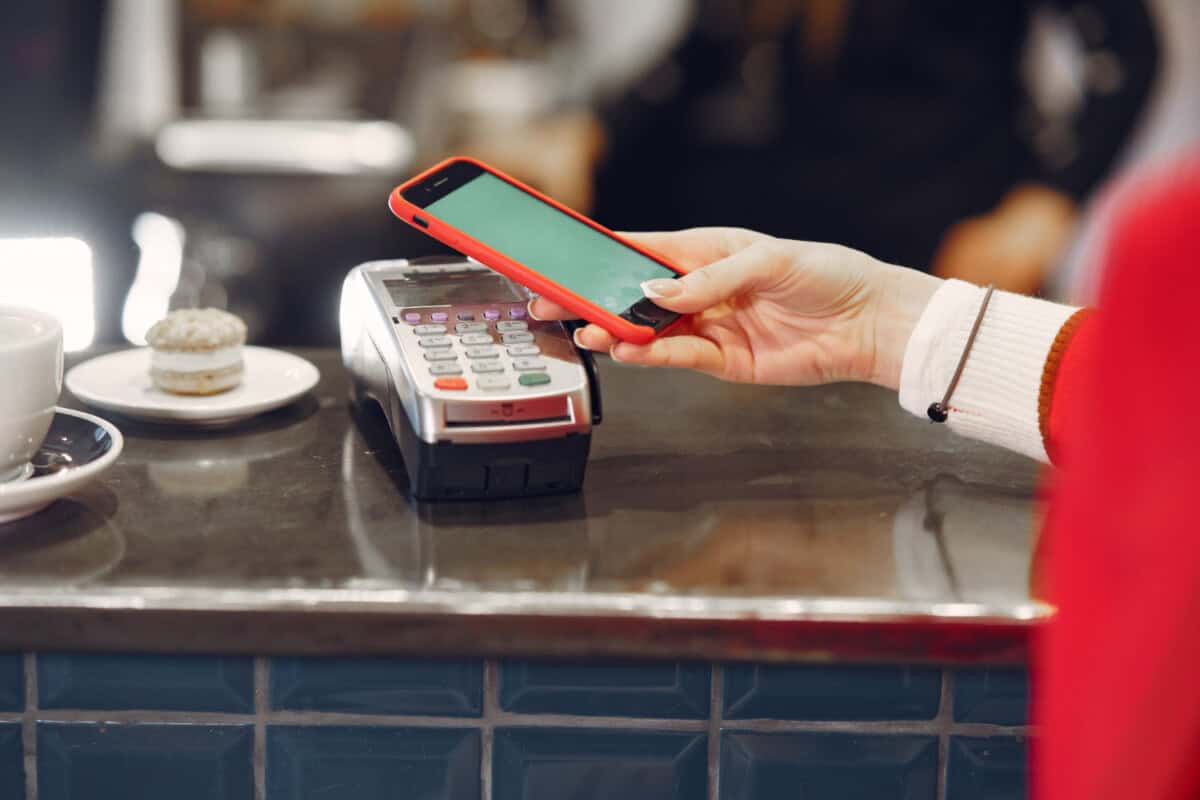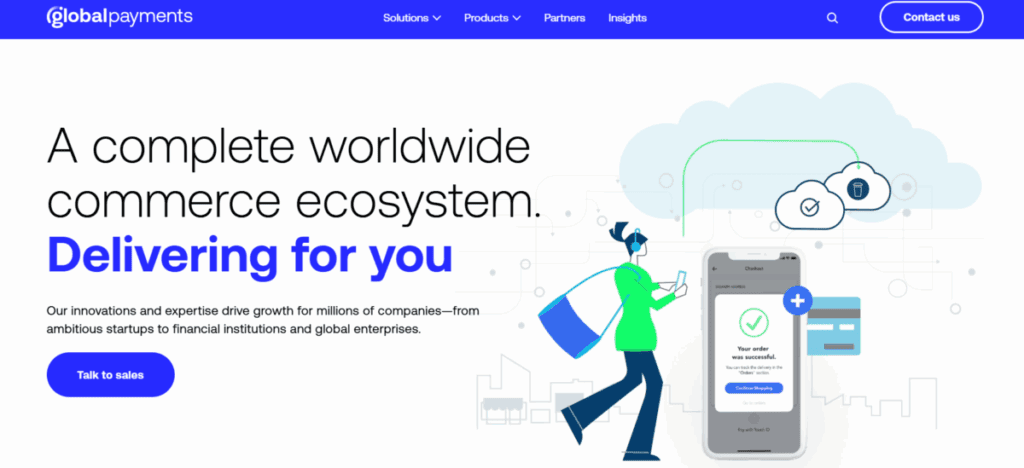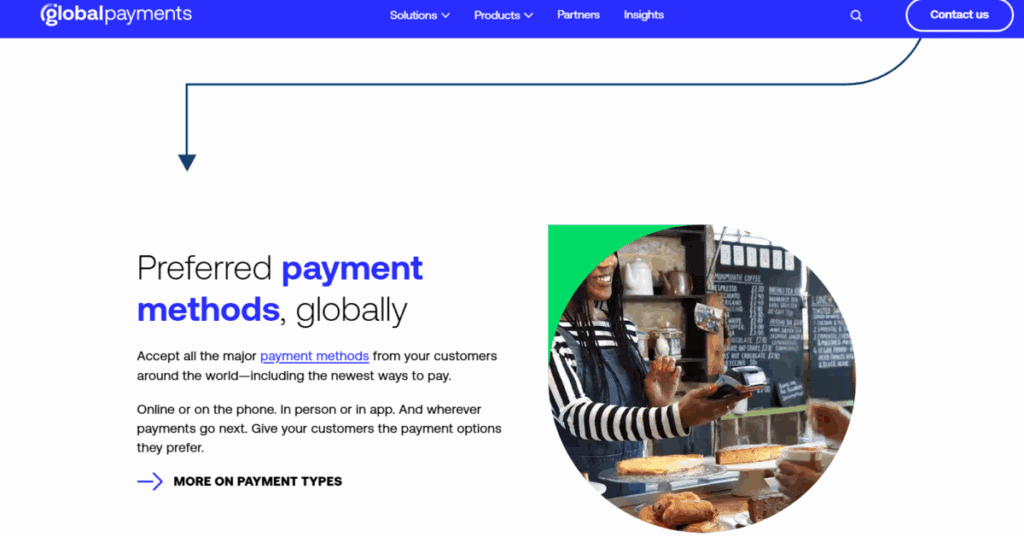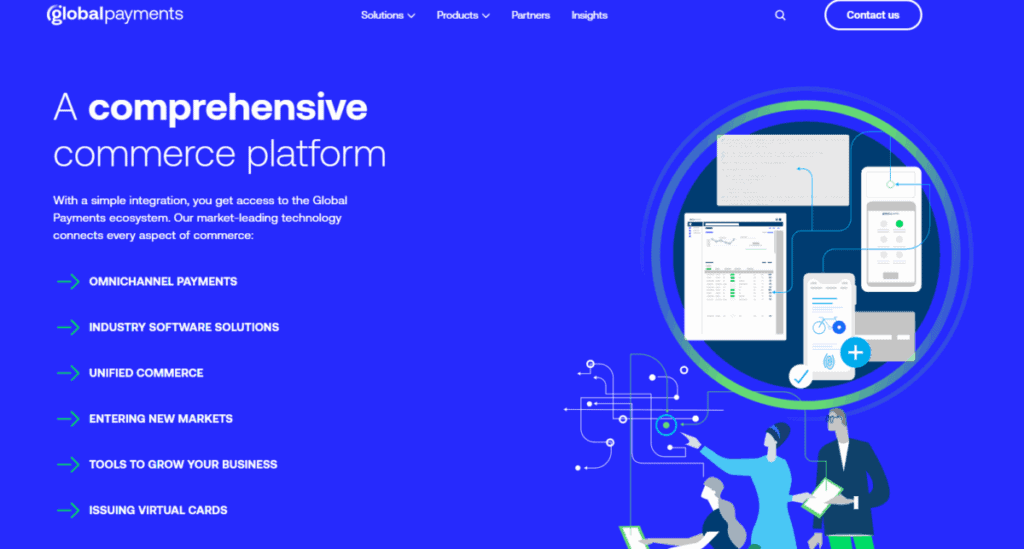
Global Payments Review
- 02nd Jun, 2025
- | By Linda Mae
- | Reviews
Global Payments Inc. is one of the most recognized names in the fintech and merchant services industry. Headquartered in Atlanta, Georgia, it serves businesses in over 100 countries and processes billions of transactions annually. The company has evolved through decades of expansion and key acquisitions, positioning itself as a major player in both traditional and modern payment processing. Lets read more about Global Payments Review.
The company offers a broad spectrum of payment solutions including, POS systems, digital commerce tools, and security services. Its technology is used by businesses of all sizes; from single-location merchants to multinational corporations. Over the years, Global Payments has merged with and acquired several firms, such as TSYS, which has helped expand its capabilities and strengthen its infrastructure.
Global Payments does have some drawbacks, though. Although it positions itself as a one-stop shop for processing payments, it has drawn criticism from some retailers, particularly small companies, for its complicated pricing and unclear contracts. Large corporations, however, often appreciate its dependability and worldwide scalability.
The company is investing in omnichannel commerce, integrated software solutions, and mobile payment systems as part of its ongoing innovation in a rapidly changing payment landscape. Even though it might not be the ideal choice for all kinds of merchants, Global Payments’ dedication to staying ahead of the curve makes it a significant provider in the fintech ecosystem.
Core Payment Processing Capabilities | Global Payments Review
At its core, Global Payments offers a full suite of payment processing services. It supports credit and debit card transactions, digital wallets, contactless payments, and ACH bank transfers. These services are available across both physical and digital environments, making it possible for businesses to handle in-store, online, and mobile transactions seamlessly.
The platform emphasizes speed and reliability, ensuring that payments are processed efficiently and settled in a timely manner. Transaction speeds are typically fast, and the infrastructure is robust enough to handle high volumes of activity. For many businesses, especially in retail and hospitality, this consistency is crucial for maintaining customer satisfaction.
One of the major advantages of using Global Payments is its ability to support a wide range of payment types. From EMV chip cards to mobile wallets like Apple Pay and Google Pay, the system is built to handle modern consumer preferences. Businesses operating internationally also benefit from multi-currency support and the ability to accept payments from foreign-issued cards.
That said, the company’s pricing structure can be a challenge. Interchange rates, processing fees, and equipment costs can vary, and smaller merchants may find it difficult to determine the total cost upfront. Some reviews have pointed to hidden fees or inconsistent billing, which can be a drawback for new or budget-conscious businesses.
Despite this, Global Payments’ core processing engine is dependable and flexible, suitable for businesses that value performance and a wide range of acceptance options over entry-level simplicity.
Merchant Services and Tools
Beyond basic payment processing, Global Payments offers a range of merchant services that help businesses manage and grow their operations. These include customer management systems, analytics dashboards, invoicing solutions, and even marketing tools. The goal is to provide merchants with more than just a way to accept payments; to also give them the data and insights needed to make informed decisions.
One standout feature is its real-time reporting capabilities. Merchants can track transaction histories, monitor refunds, and analyze sales trends through an easy-to-navigate portal. These insights can be particularly useful for businesses looking to optimize staffing, inventory, and promotional campaigns.
The virtual terminal, which lets businesses take payments without a physical POS device, is another helpful tool. For service providers who accept payments by phone or email, this is extremely helpful. It provides small businesses with an easy way to handle remote transactions when combined with invoicing features.
Additionally, Global Payments provides integration with a number of accounting and CRM programs, which helps businesses that use platforms like Salesforce or QuickBooks run more efficiently. However, the merchant’s package or the area in which they operate may have an impact on the degree of integration.
While many of these features are robust, they may come at an additional cost. Not all tools are included in the base package, and merchants should be cautious about add-on fees. Still, the breadth of services available makes Global Payments a solid choice for businesses seeking comprehensive operational support.
POS and Hardware Integration
Global Payments supports a wide array of POS solutions that can be tailored to different industries. Whether it’s a compact terminal for a small café or a robust multi-terminal setup for a chain retailer, the company offers hardware that is both scalable and modern.
Its proprietary POS systems come equipped with touchscreen interfaces, inventory management tools, and customer engagement features. The hardware is designed to be user-friendly, even for staff without technical expertise. For businesses already using third-party systems, Global Payments is compatible with many popular POS providers, making integration relatively straightforward.
Another strength lies in its support for mobile POS systems. For businesses that need on-the-go functionality; such as food trucks, event vendors, or field service providers; the mobile options are reliable and easy to set up. Bluetooth card readers and app-based terminals provide flexibility without compromising security.
Installation and setup are generally smooth, especially when purchased directly through Global Payments. However, businesses that onboard through independent sales organizations may experience varying levels of support. This inconsistency can be frustrating and may require merchants to be more proactive in their setup process.
Overall, Global Payments offers strong POS options for merchants who want a blend of hardware reliability and business-specific functionality. Just be aware that premium features and hardware upgrades may come at a higher price point, so it’s essential to weigh the benefits against the costs.
E-commerce and Online Payment Features
For businesses operating online, Global Payments delivers a full suite of e-commerce tools designed to facilitate secure and flexible transactions. Its hosted checkout solutions, payment gateways, and developer-friendly APIs allow for both quick deployment and deep customization.
The company’s online payment platform supports various payment methods including credit cards, digital wallets, and bank transfers. Its APIs are well-documented, making it easier for developers to integrate the system into websites, mobile apps, and custom-built platforms. This makes it appealing for both small retailers and large enterprises seeking a seamless user experience.
Additionally, subscription management and recurring billing are supported by Global Payments. SaaS and service-based businesses will find this especially helpful. Payment methods can be safely stored by customers, allowing automatic billing and lowering the possibility of late payments. Its support for global e-commerce is an additional advantage. The platform can accommodate companies wishing to enter international markets thanks to its multi-currency acceptance and global acquiring capabilities. However, cross-border transactions might incur extra fees.
One downside is that the platform may require some technical expertise to unlock its full potential. While there are plug-and-play options available, merchants with limited IT resources may find initial setup or troubleshooting a bit challenging. Still, once configured, the system is stable and versatile. In summary, Global Payments’ e-commerce features are robust and scalable, well-suited for businesses that prioritize flexibility and global reach in their online operations.
Security, Fraud Prevention, and Compliance
Security is a top priority for any payment processor, and Global Payments has invested heavily in maintaining high standards of protection. The company is PCI DSS compliant and offers a variety of tools aimed at minimizing fraud and safeguarding customer data.
One of the core technologies used is P2PE, which ensures sensitive card data is encrypted from the moment of entry. This significantly reduces the risk of data breaches during transactions. Additionally, tokenization is used to replace card details with unique identifiers, adding another layer of security.
Fraud detection features include real-time transaction monitoring, velocity checks, and geolocation analysis. These tools help flag suspicious activity, allowing merchants to take immediate action when something looks unusual. Some plans also offer chargeback management tools to help merchants dispute and resolve cases efficiently.
Global Payments also provides compliance assistance, particularly around PCI requirements. Merchants can access compliance tools and documentation that help simplify the process of annual validation. While this is a helpful feature, some users have noted that additional guidance or support would be appreciated, especially for small business owners unfamiliar with industry jargon.
While the overall security framework is solid, access to advanced fraud tools may depend on the pricing plan. Nevertheless, for most businesses, the standard offerings are more than sufficient to protect both customer and merchant information.
International Payment Support and Currency Handling
Global Payments excels in serving international businesses through its strong multi-currency and cross-border payment support. This is a key advantage for merchants that operate in more than one country or plan to expand globally. The platform supports over 140 currencies, and businesses can accept payments in a customer’s local currency while receiving settlements in their own preferred currency. This makes transactions more seamless and can improve conversion rates by eliminating friction during checkout.
Additionally, Global Payments provides dynamic currency conversion, allowing users to view prices and make payments in their native currency. Although buyers may find this convenient, it’s crucial to remember that, depending on the exchange rate, DCC may result in higher costs for the customer. The global acquiring network, which eliminates the need for numerous merchant accounts in various locations, is an additional advantage. For companies that have locations across multiple nations or ship goods internationally, this streamlines financial operations.
However, some merchants have pointed out that international processing fees can be higher than expected. Cross-border fees, currency conversion charges, and additional compliance requirements may increase the total cost of using these services. Even so, for businesses that require robust international capabilities, Global Payments offers a scalable solution that can meet the demands of global commerce.
Integrations with Other Platforms
One of Global Payments’ strengths lies in its ability to integrate with a wide variety of third-party platforms. This includes accounting software, CRM systems, ERP platforms, and industry-specific business tools. Popular integrations include compatibility with QuickBooks, Salesforce, Shopify, WooCommerce, and Magento. These connections allow businesses to automate key functions such as syncing transaction data, managing customer information, and generating financial reports.
Global Payments also offers APIs and developer tools for businesses that need custom integrations. These tools are comprehensive and come with solid documentation, making them suitable for teams that have in-house development resources. For restaurants and hospitality businesses, integrations with POS systems like MICROS and Aloha enhance operational efficiency. Similarly, healthcare providers benefit from integrations that link payment processing with practice management software.
While integration capabilities are generally reliable, the experience can vary depending on how the service is set up; especially when resellers are involved. Some integrations may require technical assistance or third-party developers to configure properly. In such cases, costs and complexity can increase.
Still, for businesses that rely on multiple systems to manage operations, the integration capabilities of Global Payments add meaningful value by improving workflow and reducing manual input.
Pricing Structure and Contract Transparency
Pricing is among the more intricate aspects of Global Payments. The company does not adhere to a universal pricing strategy. Conversely, expenses can differ significantly based on the size of the business, the industry, the volume of sales, and whether the merchant enrolls directly or via a third-party reseller.
Generally, retailers might face monthly fees, transaction-based costs, expenses for equipment, and occasionally lengthy contractual commitments. Interchange-plus pricing can be provided occasionally, but tiered or flat-rate pricing might also be utilized. Extra fees for PCI compliance, gateway access, and statement charges are common.
A recurring concern among merchants is the lack of transparency in contracts. Some users have reported surprise fees or unclear terms related to cancellation policies or rate increases. This makes it essential for merchants to read all agreements carefully and request a full breakdown of fees in advance.
That said, businesses with higher volumes or complex payment needs often negotiate competitive rates. Enterprise clients, in particular, tend to benefit from custom pricing and dedicated account management.
While the pricing model is flexible, it also introduces complexity. For new or small businesses, this could be a barrier. Prospective users are advised to compare quotes from different providers and seek clarity on every line item before committing.
Customer Support and User Experience
Customer support is an essential part of any payment processor’s service, and Global Payments offers a number of channels, including live chat, email, and phone. For self-service troubleshooting, it also keeps up a resource centre and knowledge base.
The manner in which the merchant is onboarded can affect the quality of customer service. Compared to companies that use resellers or independent agents, businesses that sign up directly with Global Payments usually report better experiences. Some users have found this inconsistency frustrating, particularly when it comes to technical setup or contract-related concerns.
On the user experience front, the company’s online portal is generally well-regarded. It offers clear navigation, detailed transaction records, and customizable reports. Mobile access is also available, which is useful for businesses that need to monitor activity on the go. Training resources, such as webinars and how-to guides, are provided, but may not be as extensive or beginner-friendly as those offered by more tech-focused competitors. As a result, new users might face a steeper learning curve.
Despite these challenges, Global Payments maintains a solid reputation for reliability and uptime. When issues do arise, they are usually addressed promptly, provided the merchant has access to a responsive support representative.
FAQs
Q1. Is Global Payments suitable for small businesses or only large enterprises?
Global Payments serves both, but small businesses should review contracts closely due to potential fees and pricing complexity.
Q2. Can Global Payments handle international transactions efficiently?
Yes, it supports over 140 currencies and offers multi-currency and cross-border payment solutions, though extra fees may apply.
Q3. Does Global Payments offer flexible contracts or require long-term commitments?
Contract terms vary. Some merchants have reported long-term agreements and early termination fees, so it is important to verify terms beforehand.



